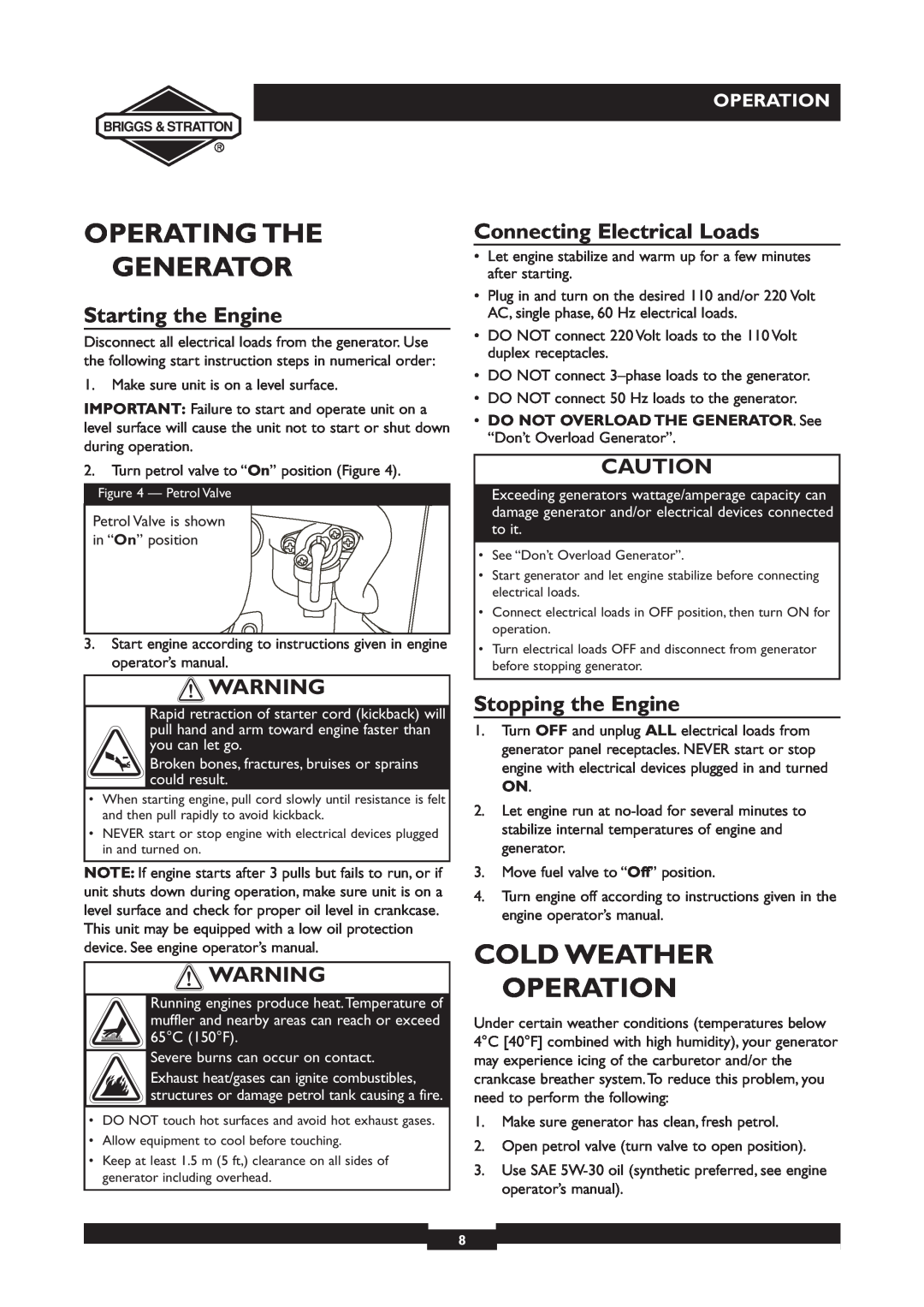
OPERATION
OPERATING THE
GENERATOR
Starting the Engine
Disconnect all electrical loads from the generator. Use the following start instruction steps in numerical order:
1.Make sure unit is on a level surface.
IMPORTANT: Failure to start and operate unit on a level surface will cause the unit not to start or shut down during operation.
2.Turn petrol valve to “On” position (Figure 4).
Figure 4 — Petrol Valve
Petrol Valve is shown in “On” position
3.Start engine according to instructions given in engine operator’s manual.
![]() WARNING
WARNING
Rapid retraction of starter cord (kickback) will pull hand and arm toward engine faster than you can let go.
Broken bones, fractures, bruises or sprains could result.
•When starting engine, pull cord slowly until resistance is felt and then pull rapidly to avoid kickback.
•NEVER start or stop engine with electrical devices plugged in and turned on.
NOTE: If engine starts after 3 pulls but fails to run, or if unit shuts down during operation, make sure unit is on a level surface and check for proper oil level in crankcase. This unit may be equipped with a low oil protection device. See engine operator’s manual.
![]() WARNING
WARNING
Running engines produce heat.Temperature of muffler and nearby areas can reach or exceed 65°C (150°F).
Severe burns can occur on contact.
Exhaust heat/gases can ignite combustibles, structures or damage petrol tank causing a fire.
•DO NOT touch hot surfaces and avoid hot exhaust gases.
•Allow equipment to cool before touching.
•Keep at least 1.5 m (5 ft,) clearance on all sides of generator including overhead.
Connecting Electrical Loads
•Let engine stabilize and warm up for a few minutes after starting.
•Plug in and turn on the desired 110 and/or 220 Volt AC, single phase, 60 Hz electrical loads.
•DO NOT connect 220 Volt loads to the 110 Volt duplex receptacles.
•DO NOT connect
•DO NOT connect 50 Hz loads to the generator.
•DO NOT OVERLOAD THE GENERATOR. See “Don’t Overload Generator”.
CAUTION
Exceeding generators wattage/amperage capacity can damage generator and/or electrical devices connected to it.
•See “Don’t Overload Generator”.
•Start generator and let engine stabilize before connecting electrical loads.
•Connect electrical loads in OFF position, then turn ON for operation.
•Turn electrical loads OFF and disconnect from generator before stopping generator.
Stopping the Engine
1.Turn OFF and unplug ALL electrical loads from generator panel receptacles. NEVER start or stop engine with electrical devices plugged in and turned ON.
2.Let engine run at
3.Move fuel valve to “Off” position.
4.Turn engine off according to instructions given in the engine operator’s manual.
COLD WEATHER
OPERATION
Under certain weather conditions (temperatures below 4°C [40°F] combined with high humidity), your generator may experience icing of the carburetor and/or the crankcase breather system.To reduce this problem, you need to perform the following:
1.Make sure generator has clean, fresh petrol.
2.Open petrol valve (turn valve to open position).
3.Use SAE
8
